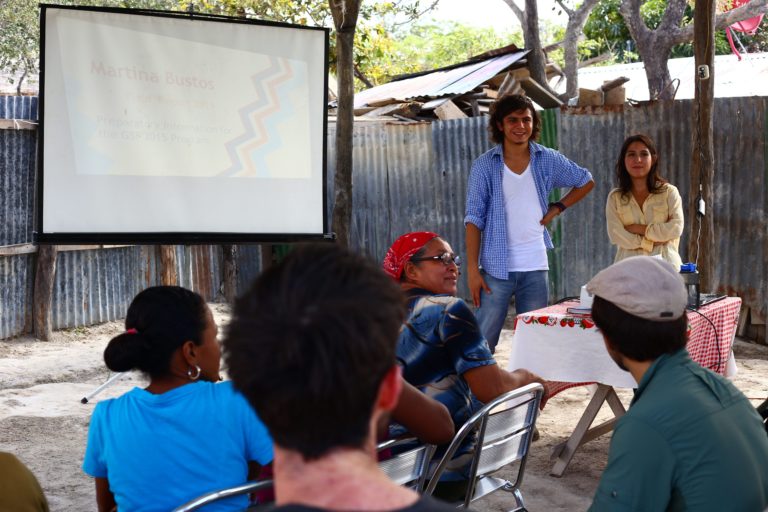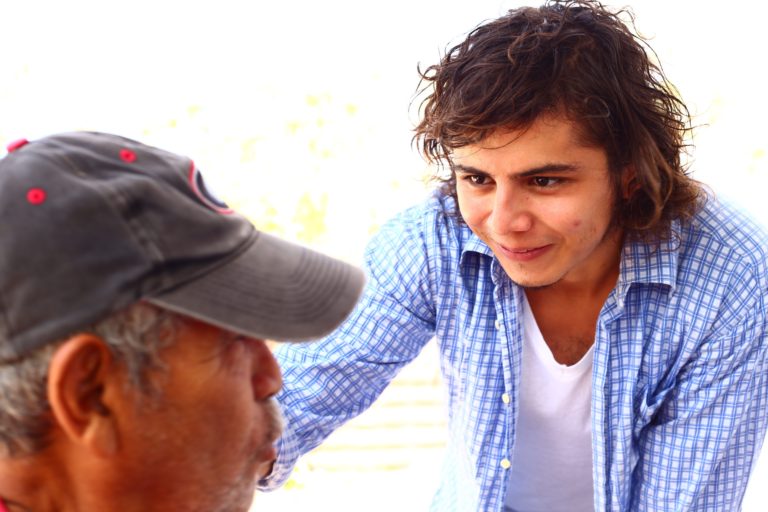After winning The Lab’s Sustainability Prize at EARTH University in 2014, as well as participating in our graduate-level Global Sustainability Fellows (GSF) program, we caught up with Antony Castro Rivera. He updated The Lab on the impacts of the Sustainability Prize and the GSF program in his work and life, and his many exciting professional and personal pursuits. Please enjoy this interview with Antony!

The Lab: You’ve participated in two different programs of The Lab—as a Sustainability Prizewinner in 2014 and as a Global Sustainability Fellows (GSF) program fellow in 2015. How have these experiences impacted you?
Antony: The Sustainability Prize of 2014 changed the course of my life. I had the opportunity to start the family business that my family and I envisioned. Earning the prize brought great satisfaction to all, and this inspired me to further invest my best efforts in the project.
Coming from a neighborhood where violence and poverty are usual, my chances for starting a business based on technical knowledge were very limited, but The Sustainability Laboratory and EARTH University believed in me and each gave me a chance. Thus, I could start to change my country by providing a useful product to those doing urban agriculture.
My participation in the 2015 GSF program opened up my narrow scientific perspective to one that integrates a vast framework of holistic concepts, which have been useful to me in addressing and preparing for projects about sustainability in Europe and Latin America. I got to understand the “system of beliefs” concept and the system dynamics approach to project development and implementation, which I found fundamental for understanding key stakeholders’ concerns, comprehensively integrating them, and thus maintaining projects viable through time after initial investments. It also impacted me deeply because I got to know about the necessities of the Martina Bustos community, which I thought impossible in Costa Rica.

The Lab: In 2014 you received The Lab’s Sustainability Prize at EARTH University for the project “Implementation of Model Adaptations for a Sustainable Urban Home in Heredia, Costa Rica”. What became of this project?
Antony: I continued the project for about two years after graduating. It grew and generated profit by providing urban agriculture products to customers in 4 provinces of Costa Rica.
We found passion for agriculture within city people, but they could not access what they needed to do it. So we became their providers.
As I wanted to be a better manager, I decided to study Sustainable Resource Management at the Technical University of Munich in Germany. Part of assets of the project served to finance my studies.
The plan was to keep running the business, but I miscalculated the time-difference effects on my ability to attend to the customers from Germany. Eventually, we decided to cease the family business until my return. Nonetheless, my grandpa kept using part of the infrastructure for producing vegetables, supplying our family with more than 15 types of vegetables. This has kept him happy, as he used to do agriculture with his father. This means a lot for all in my family.

The Lab: Tell us about what you’ve been up to recently.
Antony: I work doing research for the Technical University of Munich in a joint research project with the German Aerospace Agency. The project is called ForDroughtDet and its objective is identifying drought in trees at Bavaria, because climate change-driven extremely hot summers are significantly increasing tree mortality. We do that using high-technology sensors for inferring the vegetation’s drought affection based on information carried by light, which the human eyes cannot see.
As for personal, ad-honorem projects, I have taught programming to international master’s students. In the same manner, I worked for 1 year and 10 months doing research that made discoveries about the Amazon basin forest’s response to extreme drought, with researchers from Germany, Switzerland, Spain and Costa Rica. We did this by bridging maps on ecoregions (from the Resolve project) with a new satellite product which allow to see photosynthetic activity from space (from the OCO-2 satellite from NASA). My education from EARTH University allowed me to understand processes of the tropical forest. Once I understood what was going on, as a scientist, I felt the ethical responsibility of communicating it to my scientist peers. That could only happen through a scientific publication, so I fought hard for it. It was recently published.
I founded a German NGO called Gaia-liNc together with colleagues I met during my master’s studies. We come from Colombia, Ecuador, Costa Rica, Chile, Peru, and Germany. Gaia-liNc aims to create partnerships between Latin American and German institutions and organizations. Our purpose is to get insights on already identified necessities from the Latin American organizations and help to solve them with assets, technology and education from Germany. The German green-investment-infrastructure is very well developed, but is often not unreachable for the Latin American organizations because of a lack of knowledge on the options, a lack of a partner on the German side (us), and the German language barrier.
Also, I am currently exploring possible applications of the Amazonian photosynthesis discoveries with South American organizations and building a proposal to develop these. I hope I will get support, as so far, I have had to pay for most of the research expenses from my own funding. Moreover, I am building another proposal to work with Blockchain financial technology and waste management by integrating German and Latin American markets and institutions.
The Lab: Have you been able to apply The Lab’s approach to sustainability and five core principles in your work and life? If so, how?
Antony: It helped me to realize that sustainability work is best in teams. I learned at The Lab about the complexity of sustainability, and that I alone cannot cover all of The Lab’s “Five Core Principles of Sustainability” in my projects.
I have spread the five principles because usually people know the 3 pillars approach to sustainability. Some people struggle to acknowledge the spiritual domain, but I have experienced its importance in practice at projects in Peru and Africa. It is difficult to explain, but it connects people with their historic roots and that is a powerful asset.

The Lab: Do you have any words of wisdom for participants in the Sustainability Prize competition?
Antony: To the Sustainability prize participants: if you weren’t doing what you are doing, is possible that there would be nobody doing it. Aim for the highest and be humble at the same time. Also, know when to stand for what you know, even when you work in interdisciplinary teams where others know more than you in their areas. Stand for what you believe in and what inspires you, because otherwise you may lose your passion and get lost. If you are passionate, you may be able to use most of the chances that appear in front of you before these vanish. The success should be envisioned, it won’t just happen.
The Lab: What are your plans for the future?
Antony: In the short-term, I plan to gather funding for continuing research on the Amazonian photosynthesis discoveries, or to do a PhD program in ecology, microorganisms and agriculture. My mid-term plans are to continue gathering skills and abilities that I can use to strengthen projects in the tropics, and help to pay for my sister’s university. And in the long-term, I plan on going back to the tropics for work, where I have been happiest. Meanwhile, I plan to support projects in Latin America through Gaia-liNc from Germany.
We wish Antony luck in all of his future pursuits, and we look forward to following his career moving forward!
Showing